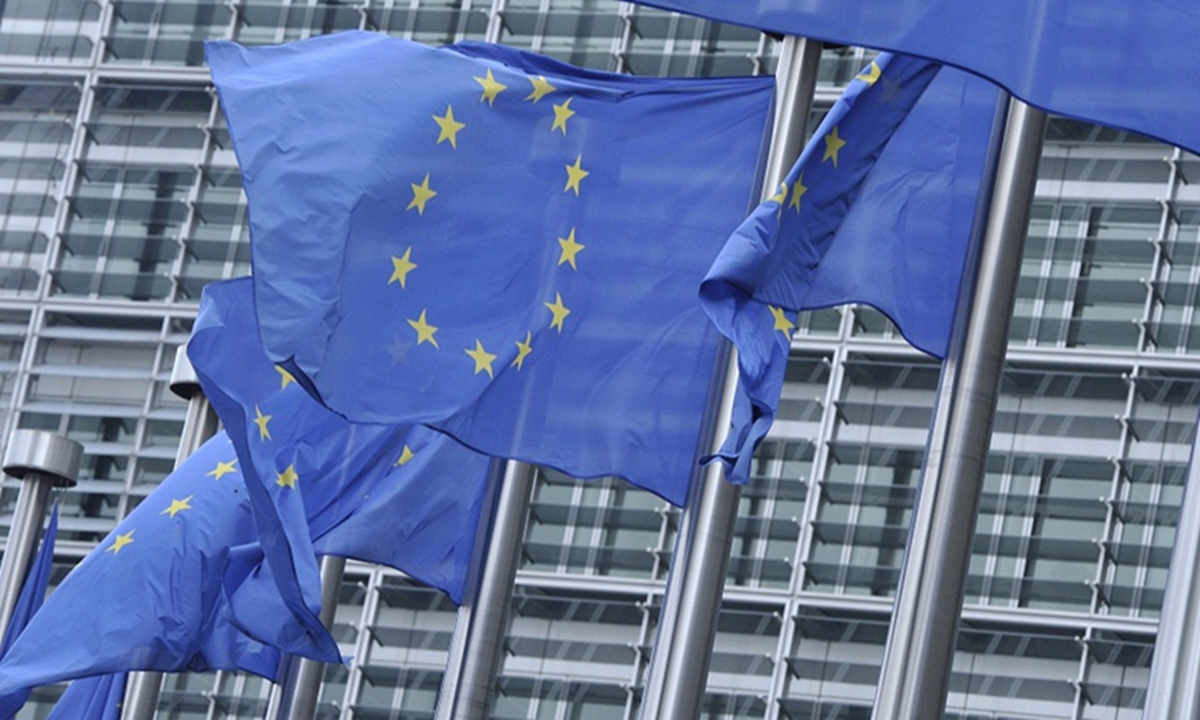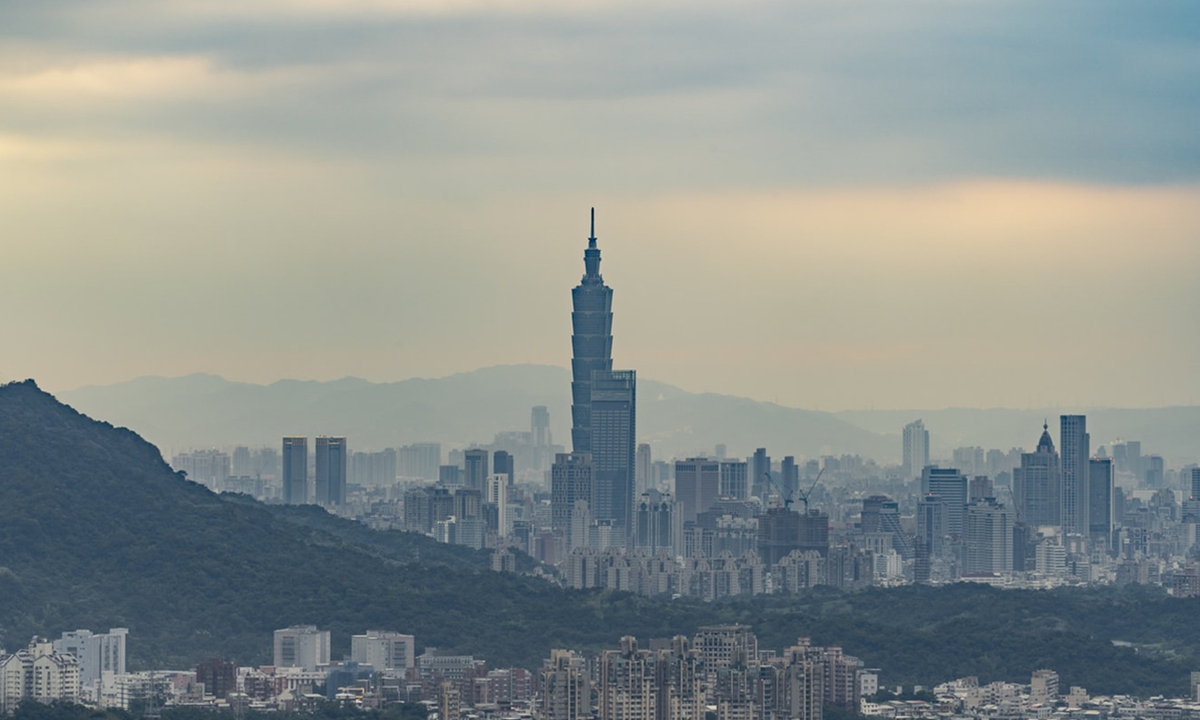
The European Union flags in front of EU headquarters in Brussels, Belgium. Photo: Xinhua
Some members of the European Parliament are poisoning and abducting ties between China and the European Union, pushing for so-called closer ties between the bloc and the island of Taiwan, which the Chinese Foreign Ministry and Chinese Mission to the EU firmly opposed, and urged them to correct the wrong deeds.
Influenced and instigated by the US, some European countries such as Lithuania and certain members of the European Parliament, have gone astray further on the anti-China road by promoting ties with the Taiwan island, and such practices are not only damaging ties with the Chinese mainland but also destabilizing cross-Straits ties, pushing the mainland to give a tougher response to the island, analysts said.
On Wednesday, the European Parliament's Committee on Foreign Affairs adopted a report, titled "EU-Taiwan Relations and Cooperation," calling for elevating EU-Taiwan "political relations," changing the name of "the European Economic and Trade Office" in Taiwan to "European Union Office in Taiwan," including Taiwan into the Indo-Pacific Strategy, and advocating Taiwan's full participation as an observer in international bodies.
"These moves exceed the scope of normal non-official economic and trade cooperation and cultural exchanges between the EU, its member states and the island of Taiwan, constitute serious violations of the One-China principle and undercut mutual trust and cooperation between China and the EU. We express our strong opposition to this," the spokesperson of the Chinese Mission to the EU said in a release on Thursday.
China’s National People's Congress Foreign Affairs Committee also issued a statement on Thursday to firmly oppose MEPs pushing for closer ties with the island of Taiwan, citing it severely violates one-China principle and damages China-EU mutual trust and cooperation.
Taiwan question is China’s domestic affairs and relates to China’s core interests. The Chinese people’s resolute to realize the reunification is unshakable. We urge the EU parliament to be fully aware of the sensitiveness of the Taiwan question and be more prudent on words and deeds related to the island to avoid affecting the political base for China-EU ties and mutual trust.
"We want to solemnly inform the EU not to underestimate Chinese people's resolute, strong capability and firm willingness to safeguard national sovereignty and integrity and stop all provocations and confrontational moves," Chinese Foreign Ministry spokesperson Wang Wenbin said at a routine press conference on Thursday.
The European Parliament said in a release on Wednesday that members of the European Parliament (MEPs) advocated closer relations and a stronger partnership between the EU and the island of Taiwan guided by the EU's one-China principle. However, analysts criticized the MEPs for playing word games.
By playing such tactics, some anti-China MEPs actually want to challenge the one-China principle and replace the sovereignty state with the idea of a "democratic entity" to promoting the international status of the island of Taiwan, Wang Yiwei, director of the institute of international affairs at Renmin University of China in Beijing, told the Global Times.
"These MEPs' hypocrisy and malicious purposes are too obvious to hide. With these MEPs, the European Parliament has also become a populist organization that violates the interests of the EU and attempts to abduct China-EU ties," Wang said, noting that some MEPs hype the Taiwan question to seek attention and personal political gains.
Charlie Weimers, a Swedish MEP from the European Conservatives and Reformists group and the rapporteur of the report, tweeted Thursday that "Delighted that the Foreign Affairs Committee overwhelmingly voted in favor of" his recommendation on "EU-Taiwan relations" and said it was a "historic day as it's the first time such a report has been adopted."
The Swedish MEP has always held a tough attitude toward China. In April 2020, he was described as "at the forefront of calling for" the investigation into China's handling on the COVID-19 crisis and accused China of delaying in releasing the information to the world. In October 2020, he was quoted by DW in a report as saying that the EU should have no dealings whatsoever with a Chinese firm that is alleged to be involved in China's Xinjiang for "human rights abuse."
Some European scholars also said that the opposition parties in some small countries in the EU are more eager to sway the EU's regional policies. Compared to Germany, France, or Italy, these countries have less trade with China or investment from China, so they are more impulsive to use human rights as a cover to earn political support domestically, and the European Parliament offers them the platform.
According to a release from the European Parliament on Wednesday, the draft report was approved by 60 of the 70 MEPs. It will submit it to a vote in the plenary next month.
Liu Zuokui, a research fellow on European studies at the Chinese Academy of Social Sciences, believed that the report is likely to be adopted by the European Parliament, which will seriously damage China-EU relations and may affect the China-EU trade agreement.
Exchanges between the EU and China are less frequent compared with pre-COVID-19 pandemic and some anti-China forces have dominated the parliament after the 2019 election. After China sanctioned the MEPs over Xinjiang and Hong Kong issues in response to EU's sanctions on Chinese officials and entities, the anti-China vibe has been rampant in the European Parliament, Liu noted.
But the Council of the EU, which adopts European legislation together with the European Parliament, is less likely to adopt the report as it does not fit the EU's interests and some member states which appreciate ties with China may block it, Liu said.
In response to the EU's unilateral sanctions on Chinese individuals and entity on March 22 for so-called human rights issues in China's Xinjiang, the Chinese Foreign Ministry announced on March 22 counter-sanctions on 10 individuals and four entities from the EU that harm China's sovereignty, security and interests. Reinhard Butikofer, Michael Gahler, Rapha?l Glucksmann, Ilhan Kyuchyuk and Miriam Lexmann of the European Parliament were on the sanctions list.
As a follow-up of a previous round of tit-for-tat sanctions from the two sides in March, the newly adopted report may also shadow twists-and-turns in the relations between China and the EU in the near future if the European Parliament keeps provoking China, He Zhigao, a research fellow with the Institute of European Studies from the Chinese Academy of Social Sciences, told the Global Times.
The European Parliament has gone further on the anti-China road recently, from imposing sanctions on Chinese individuals for alleged "human abuse" in the Xinjiang region in March, to passing a motion recommending freezing the EU-China Comprehensive Agreement for Investment (CAI) in May, to calling on EU officials to boycott the 2022 Beijing Winter Olympics in July, analysts said.
Several reasons are attributed to the EU's swing in ties with China: its anxiety over China's increasing strength, the recent interactions with the Biden administration and the current political transformation of the EU, He said.
"The Biden administration has increased coordination with the EU, watering down EU's disappointment to the US from the Trump administration," said He, noting that as the US is pivoting to the Western Pacific and ramping up efforts to compete with China, China and the EU may also face increasing tensions on issues including economy and technology and the international order.
However, the expert noted that China-EU ties should not be affected by China-US ties as there is more room for cooperation than competition between China and the EU, and the EU should seek strategic autonomy as it claimed previously instead of being dictated by the US in foreign policies.

Photo: Unsplash
Xin Qiang, deputy director of the Center for American Studies at Fudan University, told the Global Times that some Western politicians are playing the "Taiwan card" in an attempt to suppress China, "but they miscalculated."
Xin said the Taiwan question is one of the most sensitive and complicated issues concerning China's core interests, and if the EU officials fail to realize the point, they are doomed to draw fire upon themselves.
Lithuania is proof. On August 10, China announced to recall its ambassador to Lithuania and also demanded the Lithuanian government recall its ambassador to China. The actions came after the Lithuanian government announced its decision to allow Taiwan authorities to open a "representative office" under the name of "Taiwan."
Chinese mainland analysts said Lithuania's politicians have no idea how hilarious they are in provoking China, which is the second largest economy and a permanent member of the UN Security Council, and they have seriously harmed their own national interests by making short-sighted decisions to challenge China's sovereignty on the Taiwan question.
In Taipei, the foreign affairs authority on the island of Taiwan expressed gratitude toward the European Parliament's action, while pledging to continue to enhance Taiwan-EU relations, a local media outlet reported on Thursday.
The separatist Democratic Progressive Party (DPP) authority is trying to hype the European Parliament's move as a "victory in diplomacy," Xin pointed out, but warned that the DPP-claimed international support will only accelerate tensions across the Straits and harm cross-Straits peace and stability.
This will not benefit Taiwan, but will only provoke the mainland to make a tougher response, and cross-Straits relations will fall into a vicious circle, Xin noted.





